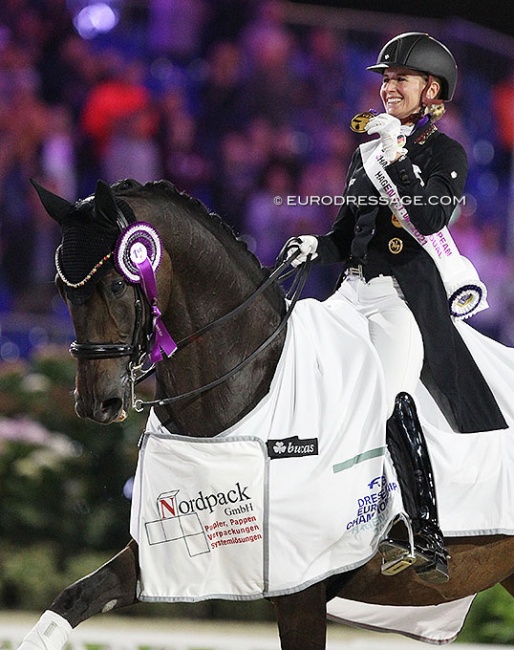
Olympic champion Jessica von Bredow-Werndl is surfing on a golden wave that started in Tokyo and is carrying her across continents to also strike at the 2021 European Dressage Championships hosted at Hof Kasselmann in Hagen on 6 - 12 September 2021.
As the drum major of the German team, she led Germany to team gold on Wednesday. Competing in the Grand Prix Special in the beneficial last position on the order of go under the floodlights on Thursday evening 9 September, Von Bredow-Werndl continued her golden streak and claimed individual gold.
The silver went to Germany's evergreen Isabell Werth, who got her second individual European silver medal. Her first European silver was in 2007 and amazingly all the rest is gold! Denmark's Cathrine Dufour gritted her teeth and finally got another individual medal, bronze, just like two years ago at the 2019 Europeans in Rotterdam and four years ago at the 2017 Europeans in Gothenburg.
Hot Weather, Tired Horses, Lots of Mistakes
Grand Prix Special day in Hagen was a peculiar one. The weather was hot and humid with a thunder storm approaching in the distance but fortunately no rain spoiled the party.
The class started at 17h00 and would become one under floodlights. This timing allowed for more spectators to attend after work and the seats were almost full. Hagen is allowed a capacity of 4900 spectators under corona restrictions and it was great to see the crowds turn up and bring atmosphere and ambiance to the venue with their clapping, cheering and even a whistle here and there to reflect their opinion on the judging.
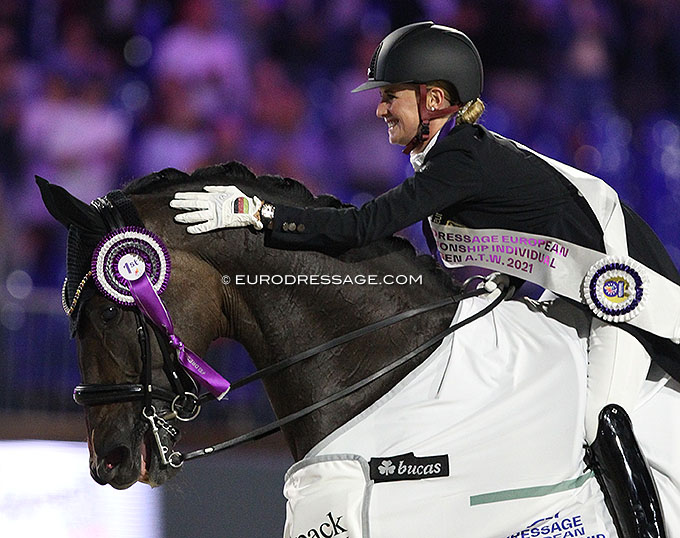
Furthermore, the point differences between the individual judges came to unacceptable standards at this level from an experienced 5* panel. Daniel Bachmann's marks, for instance, ranged between 73.191% and 79.681%, a 6,49% difference between the judges (and both the high and low judge were at the short side). Fortunately with seven judges, the impact of an individual judge is less and the two extreme scores cancelled each other out. Dorothee Schneider's marks had a 6,06% difference, Jeanna Hogberg's 5,4%, Jessica von Bredow's and Isabell Werth's 5,3%, and there were more riders where the difference was between 4 and 5%. A Judging Supervisory Panel was working this Championship, but if one judge is consistently one point higher or lower, the JSP can not do any fixing. It's only in place for obvious errors, where a judges failed to see a technical mistake due to a wrong angle.
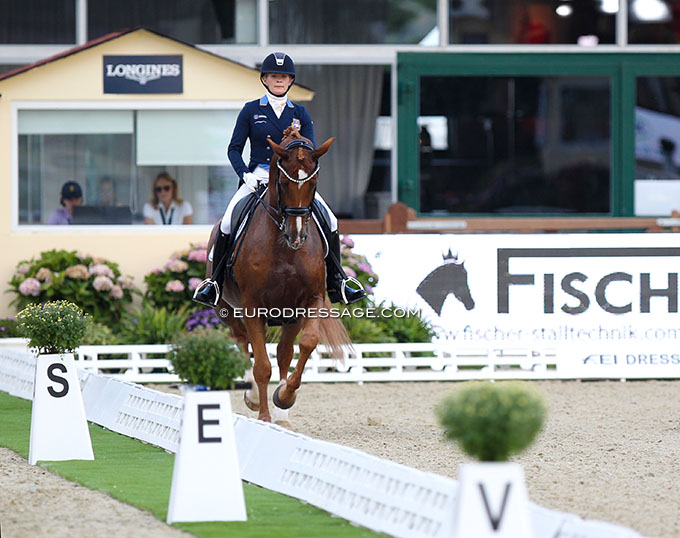
Furthermore I have never been a fan of a reserve order draw as it has been scientifically proven that scores go up towards the end of the class (rank order bias), giving a clear advantage to the last starters in the class. In addition, it makes the first part of the competition a bit less interesting and if some of the top riders were also competing in these first groups, people would stay glued on their seats instead of running up and down the stands to buy Aperol Spritz and Flammenkuchen as part of the entertainment experience. And then I won't start talking about the fact that there are two individual medals, one for the Special and one for the Kur, instead of adding the points of all three rounds and proclaiming one clear European Dressage Champion and clear silver and bronze medalists. Oh well, I think I'm getting old fashioned.
Golden Jessica
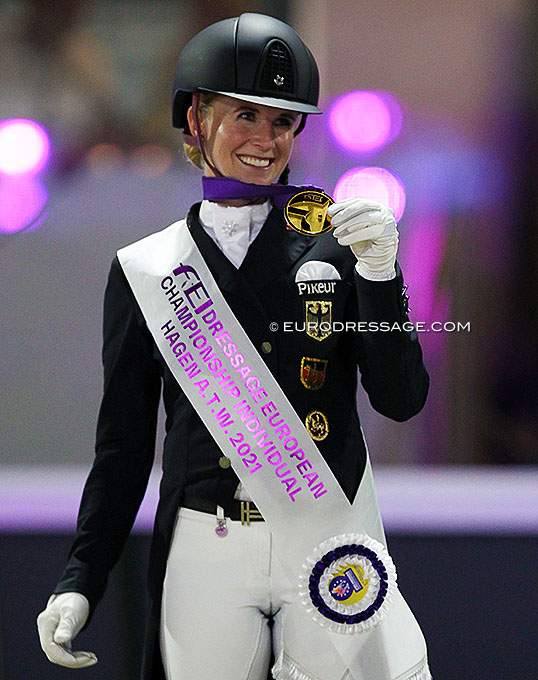
Already on the centreline the mare's tail went up, indicating she had to poo. Twice a pooping incident caused Jessica to loose many valuable points (Rotterdam, Kronberg), but this time in Hagen it was not in the trot half passes but in the extended trot and the mare kept going. What was different from before is that the mare was not entirely even in front, with the right front leg extending more than the left one. She did achieve good overtrack though. Dalera got too passagey before the trot half passes, but they were extremely smooth and ground covering. Jessica rode to her custom made GP Special music but quickly got behind her music and it was interesting to see that the movements no longer matched the music, but Jessica stayed calm and collected and rode her programme. The extended walk had two hooves overtrack and good rhythm, the collected was lateral (5.1). The piaffe-passage serpentine was beautifully ridden, with such ease and clockwork rhythm. In the canter half passes she lost impulsion. The two tempi changes were so relaxed, straight and forward, but there was a mistake in the ones. The left pirouette was a bit unbalanced and quick, the right one good. The final centerline was wonderful. Dalera stands apart with the total effortless with which she masters the Grand Prix programme. Always in balance (except sometimes in the piaffes), but always in rhythm, smooth, happy looking, and in control.
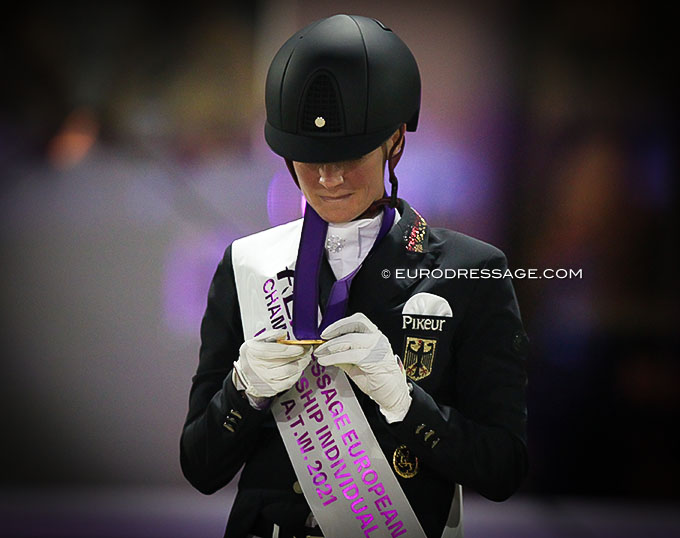
"I can't believe it yet," said a beaming Von Bredow. “Winning in front of the home crowd was great, we’re not used to it anymore. When we entered the arena Dalera became even bigger, put her ears up, she was really excited and when I did the trot extensions I tried not to move because it could have brought her out of balance because she was so on fire! It’s a great feeling, especially after the Olympics, that she’s so fit and so happy again."
Isabell Werth Regroups and Rides to Silver
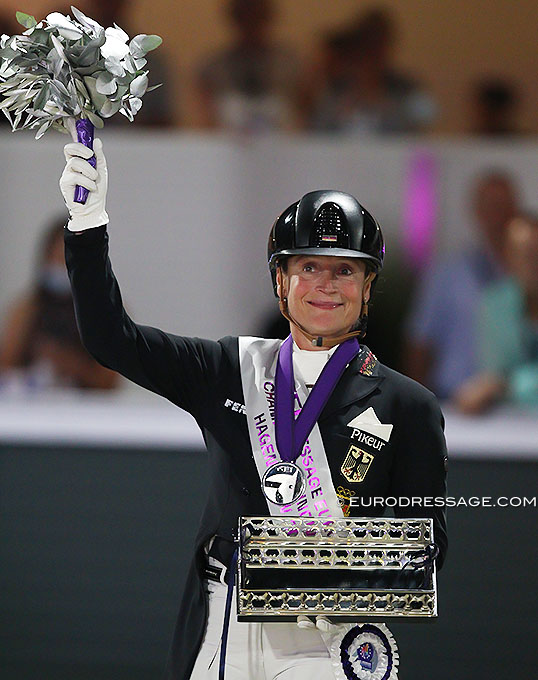
For Hagen Isabell opted to ride Christine Arns-Krogman's 16-year old Oldenburg mare Weihegold (by Don Schufro x Sandro Hit) who competed at 3 CDI's here but was two months off from competition during the summer when Werth focused on Bella Rose and Tokyo. In the Grand Prix on Wednesday the mare was very well ridden in a controlled test, but was not like her sharp, usual self. In the Grand Prix Special, Werth had the mare a bit more jazzed up, but the extra flash did not always come to expression. In the trot extensions she did not get the required overtrack (score 7.2), but the passage was quick, regular and off the ground. The half passes were regular but flat. The transition to walk was again via the halt, the extended walk had no overstep and the quality of the collected walk got compromised before the first piaffe. The piaffes were on the spot, but the mare did not pick up her hindlegs as much as she usually does and moved them more out than under. Werth rode every step very carefully though and there lies her strength as a rider. The tempi changes were good, the extended canter was superb but the flying change at the end a bit small, the right pirouette needed a bit more polish in the exit. The passage on the final centerline was outstanding, the piaffe had the hindlegs out.
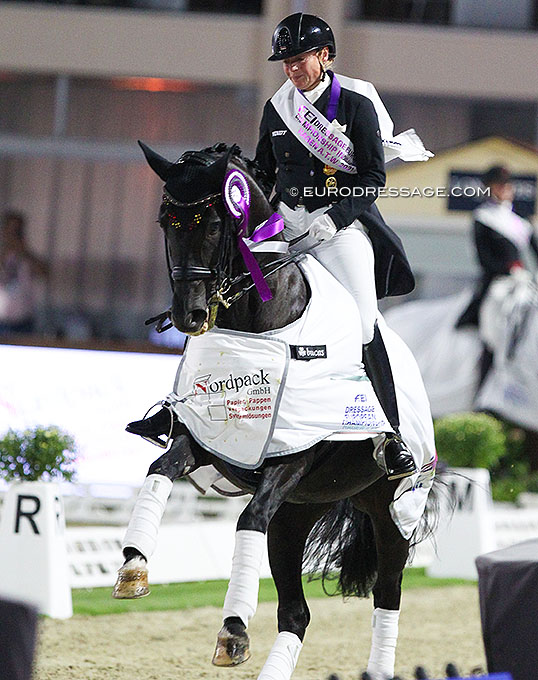
"I knew I had to fight and take all the risk I could, she’s so experienced in this business, more in the Freestyle than the Special, but this was one of her best Specials, no big mistakes, and I’m very happy with her”, said the lady who won her first European Grand Prix Special title with the great Gigolo back in 1991 in Donaueschingen (GER).
Werth added, "it was a difficult day and I was not so motivated to come and ride. Weihe was fantastic. She motivated me. In the warm-up I forgot everything around. I was enjoying the ride in the arena. I really could try to ask as much as possible. Both of us were focused. She was taking me with her."
Bronze for Dufour
Catherine Dufour and the Zinglersen family's 11-year old Westfalian gelding Bohemian (by Bordeaux x Samarant) finally had their moment of glory together that was rewarded with an individual medal.
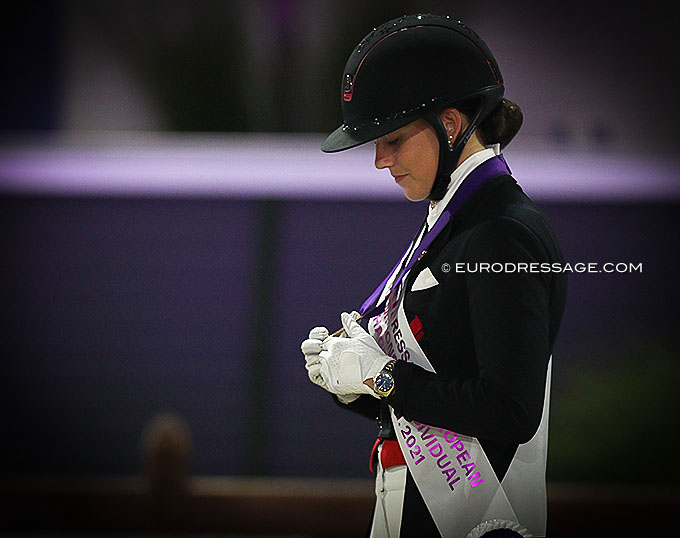
The judges scored the test 81.079%, good for a third place. The low score was 79.255 (Lang), the high score 83.830% (Baarup).
The 29-year-old Dane has been reflecting over the last few weeks. “What I felt in the last few tests was that I had to push him a bit too much in Tokyo, and that’s not at all the way I want to ride him. Today I wanted to build more trust so he doesn’t feel that I push him one thousand percent every time he goes in the ring, because I had the feeling he might not continue to perform with me if I continue to ask for more. But today he was so confident. I could have asked for more but I want to rebuild that trust and show him that it’s super-nice to be in the ring. What Tokyo has taught me is that less is more”, Dufour told the FEI. “He will give me the moon as long as I offer trust and space for him to grow, which I feel I forgot the last few times. Yesterday I had a nice feeling but today was even better."
British Trio
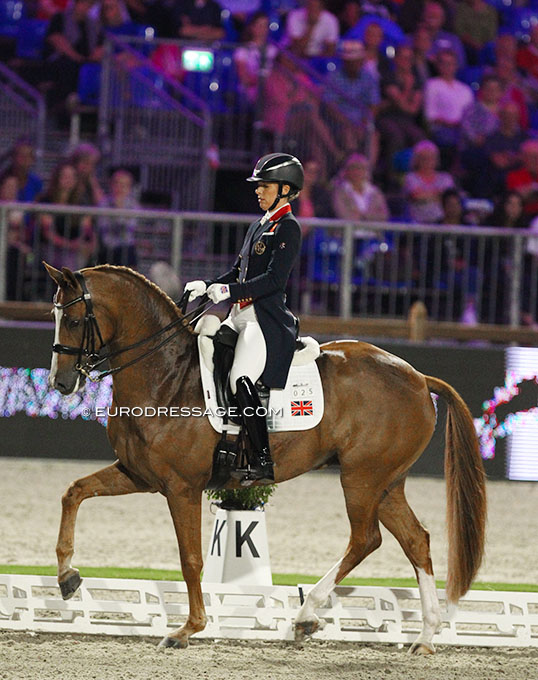
After winning Kur bronze at the Olympics, Charlotte Dujardin and her own and Renai Hart's 10-year old Dutch warmblood Gio (by Apache x Tango) placed third in the Grand Prix in Hagen and were clear favourites for an individual medal in the Special. Her cute chestnut gelding, however, looked tired even though he kept moving his legs like an energizer bunny and gave it his all. The quality of the canter was not so clear 3-beat upon entering the ring but the halt was square. The extended trots were hurried and especially on the right lead there was little suspension. The right passage was more even in the rhythm than the left one on the short sides and in the passage serpentine he was bent to the right. The first piaffe travelled forward. In the extended walk the horse relaxed but hasn't got the largest overstep, the collected was interesting as it scored between 6.5 and 9 from the judges! The one tempi changes were great, the extended canter really uphill. In the two's there was one shorter change, as well as in the nine one tempi on the centerline. The left pirouette was the best one. On the final centerline Gio was running out of steam, he crossed the legs behind in piaffe at X (8.0). They posted 79.787% for fourth place, but the marks ranged between 78.298 (Lehrmann) and 81.277% (Wessels).
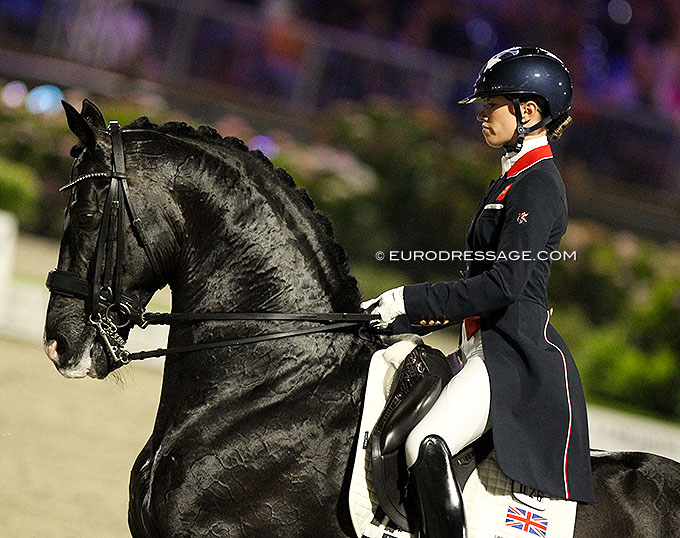
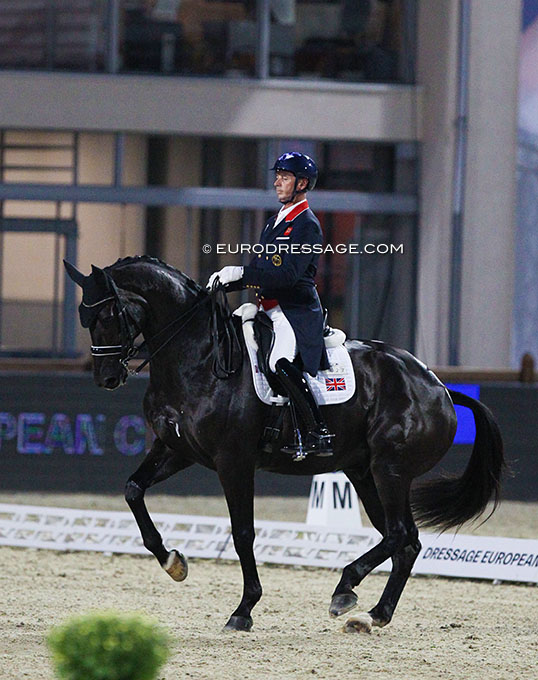
Quick Notes
Two Swedes followed in the ranking on seventh and eight place: Juliette Ramel with her 15-year old KWPN gelding Buriek KH (by Osmium x Krack C) and Therese Nilshagen on the Wespe family's 14-year old Oldenburg stallion Dante Weltino (by Danone x Welt Hit II). They posted 76.900% and 76.869% and both excelled with exceptional canter work.
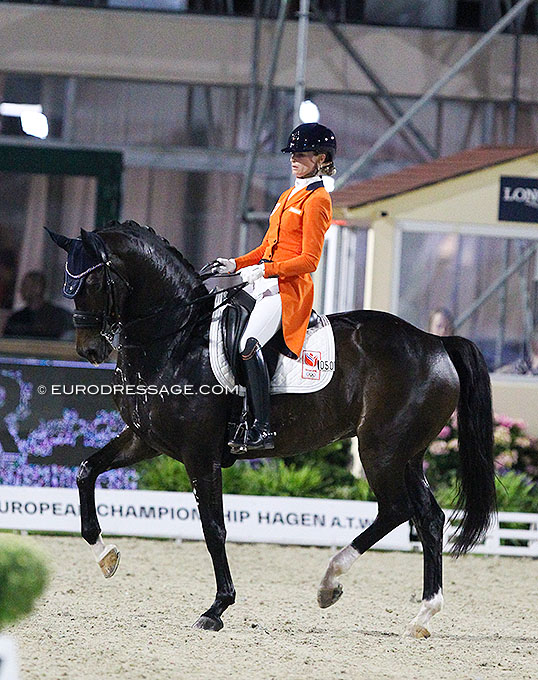
Danish Daniel Bachmann Andersen felt his 9-year old Danish gelding Marshall Bell (by Don Romantic x Michellino) struggle with the heat and lack of strength at his young age for Grand Prix. The horse has much suspension in the extended trots but was very uneven in the half pass right, right passage as well as in the last extended trot. In case of this horse, the irregularlity in the rhythm seemed more a throughness issue than a health issue. Bachmann rode him with a stronger contact and some visible half halting and could not present the same light and easy going picture he had in the Grand Prix. They posted 75.638% for 10th place.
The 2021 European Dressage Championships for seniors come to a conclusion on Saturday afternoon with the Kur to Music, which starts at 13h00.
Photos © Astrid Appels - No Reproduction allowed
Eurodressage is all week in Hagen taking photos of all riders. If you are interested in using out photos for social media or prints, send us an email FIRST.
Related Link
Eurodressage coverage of the European Dressage Championships - U25/Seniors